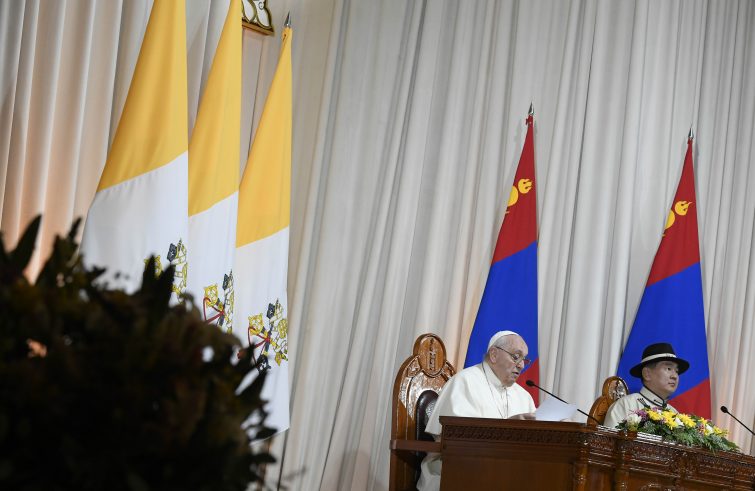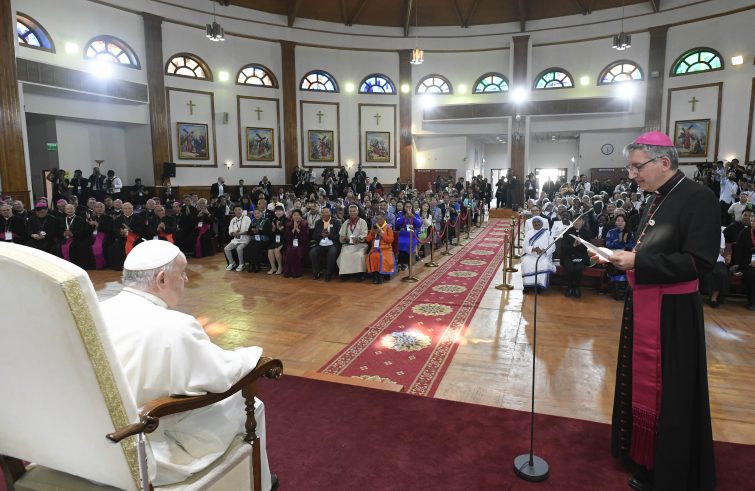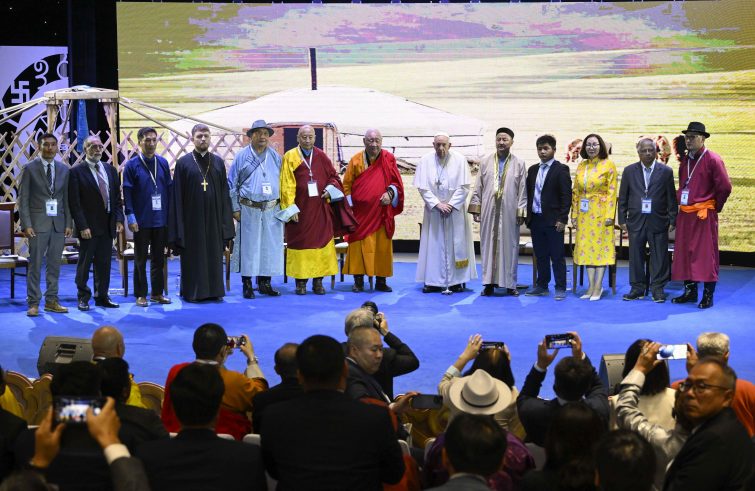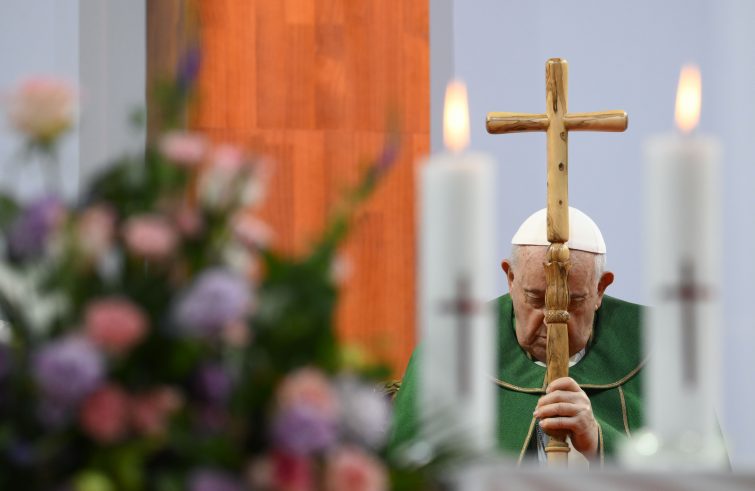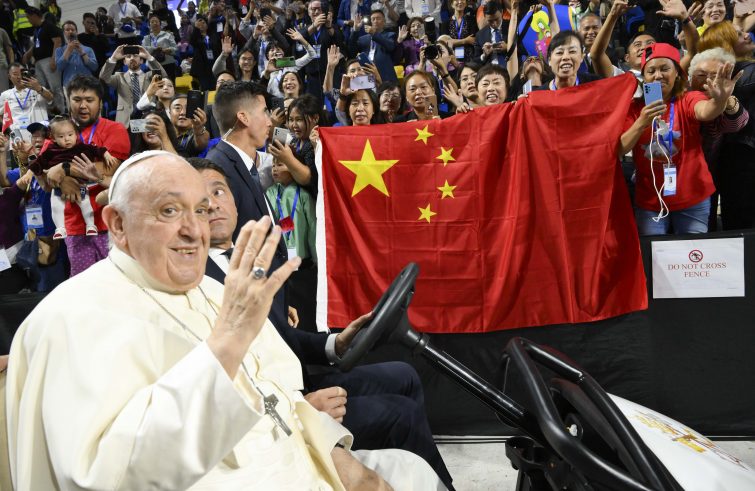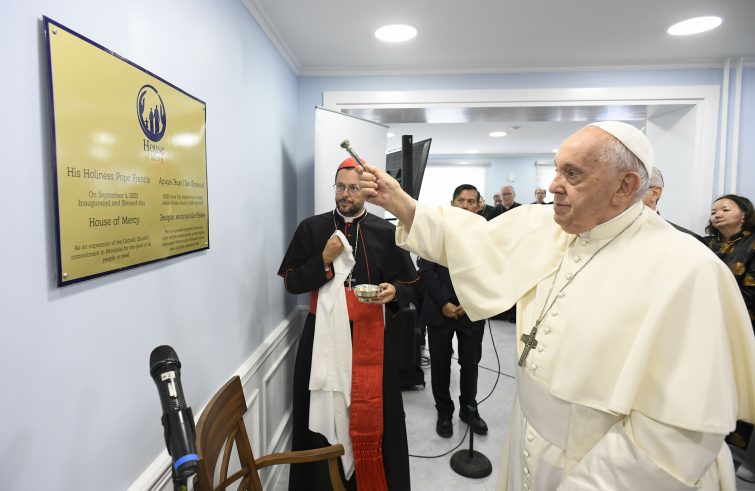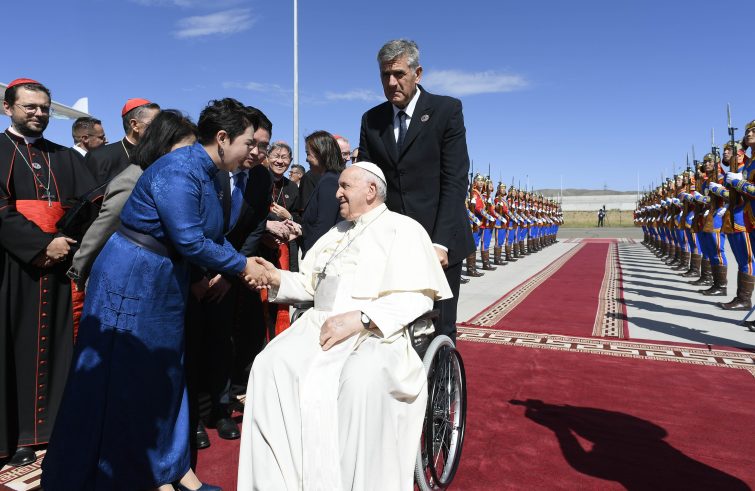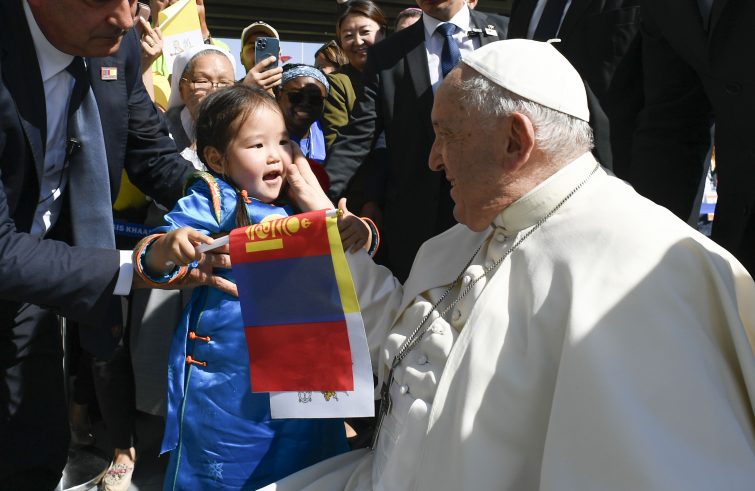
With the visit to the capital of Mongolia, Ulaanbaatar, Pope Francis concluded his 43rd international apostolic journey. The plane took off from Ulaanbaatar’s Chinggis Khan International Airport at 12.03am (6.03am in Italy) on Monday morning, scheduled to arrive at Rome’s Leonardo da Vinci-Fiumicino Airport at around 5pm.
The visit, the first by a Pope to Mongolia, began on Friday 1 September (departure from Rome was on the evening of August 31). Over the course of four days, Francis met with state authorities in the capital, Ulaanbaatar, with the small local Christian community in the Cathedral of Saints Peter and Paul, and with local religious leaders and charity workers from the House of Mercy.
It was the universal embrace of a country nestled between Russia and China. As the Pope himself said in his first address to the authorities, Mongolia proposes to play an important role in the service of world peace. The purpose of the visit was also to offer words of encouragement and hope to the small but vibrant Catholic community in the light of its precious contribution to peaceful coexistence and human development.
At the meeting with the authorities and the diplomatic corps in the State Palace on September 2, Pope Francis, introducing himself as a “pilgrim of friendship” in his first speech in Mongolia, said: “May Heaven grant that today, on this earth devastated by countless conflicts, there be a renewal, respectful of international laws, of the conditions of what was once the pax mongolica, namely, the absence of conflicts. In the words of one of your proverbs, ‘the clouds pass away, but the sky remains’. May the dark clouds of war be dispelled, swept away by the firm desire for a universal fraternity wherein tensions are resolved through encounter and dialogue, and the fundamental rights of all people are guaranteed!” The Pope sent out an appeal:
“Here, in this country so rich in history and open to the sky, let us implore this gift from on High, and together let us strive to build a future of peace.”
Francis remarked that “Mongolia is a democratic nation that pursues a peaceful foreign policy, but also proposes to play an important role on behalf of world peace.”
Also on September 2, in the Cathedral of Saints Peter and Paul, the Holy Father met with bishops, priests, missionaries, consecrated men and women, and pastoral workers who serve the Church in Mongolia. His words were an encouragement to the small community: “Brothers and sisters, do not be concerned about small numbers, limited success, or apparent irrelevance. That is not how God works.” The Holy Father praised the over thirty-year long commitment in a wide variety of charitable initiatives: “I encourage you to continue along this path, which has proved so fruitful and beneficial for the beloved Mongolian people. At the same time, I urge you to taste and see the Lord, to keep returning to that original “gaze” from which everything began. Otherwise, our strength will fail and our pastoral work will risk becoming an empty delivery of services, a roster of duties that end up inducing only weariness and frustration. Without it, in fact, your strength fails and pastoral commitment risks becoming sterile delivery of services, in a succession of due actions, which end up transmitting nothing but tiredness and frustration.” Then a reassurance to the authorities:
“Governments and secular institutions have nothing to fear from the Church’s work of evangelization, for she has no political agenda to advance, but is sustained by the quiet power of God’s grace and a message of mercy and truth, which is meant to promote the good of all.”
On Sunday 3 September, there were two key moments: the ecumenical and interreligious meeting in the “Hun Theatre” and the Holy Mass celebrated in the “Steppe Arena”. The Pope called on the various religious traditions, always ready to offer the beauty represented by the teachings of “their respective spiritual masters”, to work together for the following goals:
“In a pluralistic society committed to democratic values, such as Mongolia is, every religious institution, duly recognized by civil authority, has the duty, and above all the right, to freely express what it is and what it believes, in a way respectful of the conscience of others and in view of the greater good of all.”
Francis remarked: “We share a great responsibility, especially in this period of history, for we are called to testify to the teachings we profess by the way we act; we must not contradict them and thus become a cause of scandal. There can be no mixing, then, of religious beliefs and violence, of holiness and oppression, of religious traditions and sectarianism. May the memory of past suffering – here I think especially of the Buddhist communities – bestow the strength needed to transform dark wounds into sources of light, senseless violence into wisdom of life, devastating evil into constructive goodness.” Francis thus sent out yet another appeal for peace:
“The religious traditions, for all their distinctiveness and diversity, have impressive potential for the benefit of society as a whole. If the leaders of nations were to choose the path of encounter and dialogue with others, it would certainly be a decisive contribution to ending the conflicts continuing to afflict so many of the world’s peoples.”
At the Holy Mass Francis pointed out that “all of us are ‘God’s nomads’, pilgrims in search of happiness, wayfarers thirsting for love”, and that “the Christian faith is the answer to this thirst; it takes it seriously, without dismissing it or trying to replace it with tranquilizers or surrogates. For in this thirst lies the great mystery of our humanity: it opens our hearts to the living God, the God of love, who comes to meet us and to make us his children, brothers and sisters to one another.” At the end of the service, in a surprise gesture, drawing close to him John Tong Hon and Stephen Chow, the bishop Emeritus of Hong Kong and the current Bishop of Hong Kong, the latter a cardinal-designate who is to become a cardinal in the Consistory next September 30, the Pope sent
“a heartfelt greeting to the noble Chinese people.”
He continued: “I send my good wishes to them all: always move forward, always advance! And to Chinese Catholics: I ask you to be good Christians and good citizens.” In his greeting at the end of Holy Mass, the Pope’s “Thank you” went to Mongolia, a people particularly dear to the Pope, as he himself said, commenting on the homage given by Card. Giorgio Marengo, Apostolic Prefect of Ulaanbaatar: “Dear brothers and sisters of Mongolia, thank you for your witness. Bayarlalaa! [Thank you!]. May God bless you. You are in my heart, and in my heart you will remain.” Addressing the members of other Christian denominations and religions he said:
“May we continue to grow closer in fraternity, as seeds of peace in a world tragically devastated by all too many wars and conflicts.”
On the last day of the Apostolic Journey, September 4, the Holy Father met with charity workers and blessed and inaugurated the House of Mercy, which “is meant to be the point of reference for a variety of charitable works: hands outstretched toward our brothers and sisters struggling to navigate life’s problems. A safe haven, in other words, where people can find a listening ear and an understanding heart. While not unlike many other initiatives supported by various Catholic institutions – the Holy Father pointed out – this new undertaking is also special, since here it is the particular Church that carries out the work, coordinating the efforts of all the missionary groups, while preserving a clearly local identity, as an authentic expression of the Apostolic Prefecture as a whole.” And, he added, “I very much like the name you chose to give it: the House of Mercy.
Those two words contain a definition of the Church, which is called to be a home where all are welcome and can experience a higher love that stirs and moves the heart: the tender and provident love of the Father, who wants us to be brothers and sisters in his house.”
Francis likewise recalled: “The true progress of a nation is not gauged by economic wealth, much less by investment in the illusory power of armaments, but by its ability to provide for the health, education and integral development of its people.”
After the farewell ceremony at the airport, the Pope departed and after take-off he sent a telegram to the President of Mongolia, Khürel Sükh Ukhnaa, in which he “renews” his “gratitude” to the Mongolian authorities and people “for the warm welcome and generous hospitality shown to me during these days.” He concluded by assuring them of his “continued prayers for the peace, unity and prosperity of the nation.”

